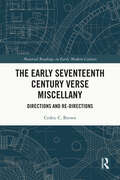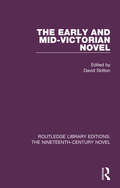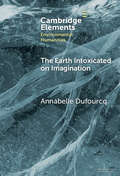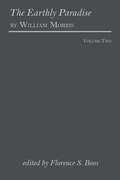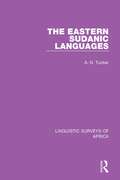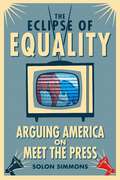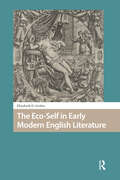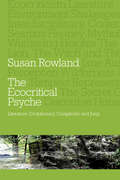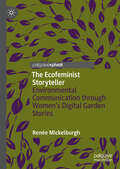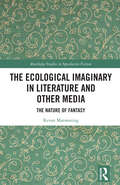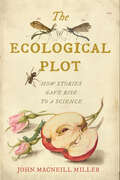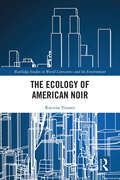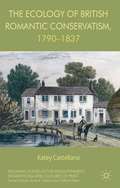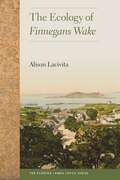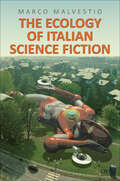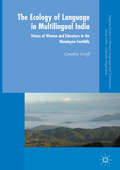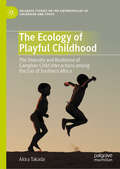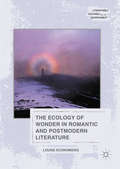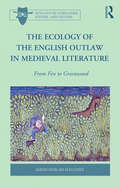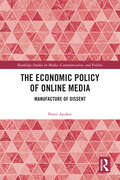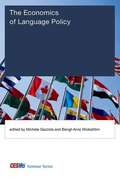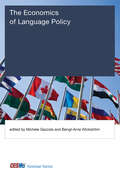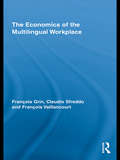- Table View
- List View
The Early Seventeenth Century Verse Miscellany: Directions and Re-Directions (Material Readings in Early Modern Culture)
by Cedric C. BrownA deeply researched study of the social transmission and adaptation of poetry texts originating in pre-Civil War England, traced through the seventeenth century and sometimes beyond. Both manuscript and printed miscellanies are used, as well as other forms of publication, and case studies unusually span elite, popular and provincial audiences. As far as possible, texts are placed according to their original contexts and functions (“Directions”) then followed through various answerings, parodies, co-optings and social, commercial and political adaptations (“Re-directions”). Case studies choose examples which have not been fully researched, so that a large amount of new material is presented from poets writing in a variety of environments. Results are sometimes startling and often amusing, giving a vivid sense of how poems were read and used in material exchange and providing a picture of literary activity far removed from what traditional, canonical literary history has often assumed.
The Early Textual History of Lucretius' De rerum natura
by David ButterfieldThis is the first detailed analysis of the fate of Lucretius' De rerum natura from its beginnings in the 50s BC down to the creation of our earliest extant manuscripts during the Carolingian age. A detailed investigation of the knowledge of Lucretius' poem among writers throughout the Roman, and subsequently the medieval, worlds allows fresh insight into the work's readership and reception, and an assessment of the value of the indirect tradition for editing the poem. The first extended analysis of the 170+ subject headings (capitula) that intersperse the text reveals the close engagement of Roman readers. A fresh inspection and assignation of marginal hands in the poem's most important manuscript provides new evidence about the work of Carolingian correctors and the basis for a new Lucretian stemma codicum. Further clarification of the interrelationship of Renaissance manuscripts of Lucretius gives additional evidence of the poem's reception in fifteenth-century Italy.
The Early and Mid-Victorian Novel (Routledge Library Editions: The Nineteenth-Century Novel #35)
by David SkiltonThe Victorian period was the age of the novel and critics at the time clearly saw the importance of prose fiction. First published in 1993, this anthology contains over fifty original extracts from contemporary critics on the early and mid-Victorian novel. Arranged thematically, the volume covers such topics as literary form, the social responsibility of literature, issues of politics and gender, the influence of criticism, realism, plot and characterisation, imagination and creativity, and the office and social standing of the novelist. The introductions and notes draw together the large number of voices and guide the reader through the Victorian literary critical debate. This accessible and invaluable guide will be of interest to those studying Victorian literature.
The Earth Intoxicated on Imagination (Elements in Environmental Humanities)
by Annabelle DufourcqThe aim of this Element is to forge new conceptual tools to give more ecological power to the human imagination. Imagination, both an innovative force and one that distances and blinds, is central to the ecological crisis as well as its potential resolution. Human imagination creates a bubble of denial, fostering the illusion of a smooth, reassuring, controlled, and neatly compartmentalized world. This Element critically contrasts the harmful modern concepts of reality and imagination with a more grounded “earthly” and “animal” imagination. It proposes to overcome the tension between two currents in environmental thought: those advocating imagination for utopian transformation, and proponents of realism, urging confrontation with the material world beyond anthropocentrism. Through analysis of key contemporary environmental work alongside insights from ethology and biosemiotics, the Element underpins the concept of “animal imagination,” offering an alternative approach to environmental imagination and activism that fosters deeper engagement with the living world.
The Earthly Paradise by William Morris: A Poem
by William MorrisThis annotated critical edition is the first attempt to make Morris's 42,000-word verse sequence accessible to a modern audience.
The Eastern Sudanic Languages (Linguistic Surveys of Africa #3)
by A. N. TuckerOriginally published in 1940 this book focusses on the three main groups of Eastern Sudanic languages, namely Moru-Madi, Bong-Baka-Bagirmi and Ndogo-Sere. The term 'Eastern Sudanic Languages' is used here primarily in a geographical sense: the dialects in the Southern Sudan form the eastern boundary of sudanic speech, where it borders on the Nilotic wedge which, in turn divides it from Hamitic speech. Despite being described because of their geographical position, the languages discussed in this book will be grouped linguistically under the names of their best known representative dialects. As well as providing some history of the Eastern Sudanic tribes, this book also contains sections on vocabulary and grammar.
The Eclipse of Equality: Arguing America on Meet the Press
by Solon SimmonsRed state vs. blue state. Republican vs. Democrat. Fox News vs. The Daily Show. The so-called culture wars have become such a fixture of American politics that dividing the country into rival camps seems natural and political gridlock seems inevitable. Entering the fray, Solon Simmons offers an intriguing twist on the debate: Our disagreements come not from unbridgeable divides, but from differing interpretations of a single underlying American tradition—liberalism. Both champions of traditional liberal values, Republicans have become the party of individual freedom while Democrats wear the mantle of tolerance. Lost in this battle of sides is the third pillar of liberalism—equality. Simmons charts the course of American politics through the episodes ofMeet the Press. On the air since 1945,Meet the Pressprovides an unparalleled record of living conversation about the most pressing issues of the day. In weekly discussions, the people who directly influenced policy and held the reins of power in Washington set the political agenda for the country. Listening to what these people had to say—and importantly how they said it—Meet the Pressopens a window on how our political parties have become so divided and how notions of equality were lost in the process. Telling the story of the American Century, Simmons investigates four themes that have defined politics and, in turn, debate onMeet the Press—war and foreign affairs, debt and taxation, race struggles, and class and labor relations—and demonstrates how political leaders have transformed these important political issues into symbolic pawns as each party advocates for their own understanding of liberty, whether freedom or tolerance. Ultimately, withThe Eclipse of Equality, he looks to bring back to the debate the question lurking in the shadows—how can we ensure the protection of a peaceful civil society and equality for all?
The Eco-Self in Early Modern English Literature (Environmental Humanities in Pre-modern Cultures)
by Elizabeth GruberThe Eco-Self in Early Modern English Literature tracks an important shift in early modern conceptions of selfhood, arguing that the period hosted the birth of a new subset of the human, the eco-self, which melds a deeply introspective turn with an abiding sense of humans’ embedment in the world. A confluence of cultural factors produced the relevant changes. Of paramount significance was the rapid spread of literacy in England and across Europe: reading transformed the relationship between self and world, retooled moral reasoning, and even altered human anatomy. This book pursues the salutary possibilities, including the ecological benefits, of this redesigned self by advancing fresh readings of texts by William Shakespeare, Christopher Marlowe, John Webster, and Margaret Cavendish. The eco-self offers certain refinements to ecological theory by renewing appreciation for the rational, deliberative functions that distinguish humans from other species.
The Ecocritical Psyche: Literature, Evolutionary Complexity and Jung
by Susan RowlandThe Ecocritical Psyche unites literary studies, ecocriticism, Jungian ideas, mythology and complexity evolution theory for the first time, developing the aesthetic aspect of psychology and science as deeply as it explores evolution in Shakespeare and Jane Austen. In this book, Susan Rowland scrutinizes literature to understand how we came to treat 'nature' as separate from ourselves and encourages us to re-think what we call 'human.' By digging into symbolic, mythological and evolutionary fertility in texts such as The Secret Garden, The Tempest, Wuthering Heights and The Lion, the Witch and the Wardrobe, the book argues that literature is where the imagination, estranged from nature in modernity, is rooted in the non-human other. The Ecocritical Psyche is unique in its interdisciplinary expansion of literature, psyche, science and myth. It develops Jungian aesthetics to show how Jung's symbols correlate with natural signifying, providing analytical psychology with a natural home in ecocritical literary theory. The book is therefore essential reading for seasoned analysts and those in training as well as academics involved in literary studies and Jungian psychology.
The Ecofeminist Storyteller: Environmental Communication through Women's Digital Garden Stories
by Renée MickelburghThis book explores the way stories that emerge from the garden and are consumed in the digital space can become a nourished method of environmental communication. Mickelburgh seeks to understand what happens when some women speak, write, and photograph their private, everyday garden lives, and share those stories with a public, global, digital world. The garden is the place people get deeply acquainted with. This book considers Australian ecofeminist Val Plumwood’s urging for a “deep acquaintance with some place, or perhaps group of places” to discover a communicative “language of the land’’. The online world brings us into closer vicinity to this humble space, and yet a distance remains. This distance—the in-between—is the space where the possibility of communication lies. In keeping with its humble focus, this book asks simple questions of the garden. What happens when Australian women gardeners tell stories of community, care and compassion in a space that is both material and digital? Does digital soundwork, sightwork, and wordwork about gardens equate to communicative groundwork? This book tries to answer these questions by examining the digital stories of Australian women’s gardening lives. It aims to engage the reader through its emphasis on showing rather than telling the way affective communication circulates in the physical place, memories, the body, and the digital realm, in conversation with the many women writers and feminist scholars concerned with the entanglement of feminism, writing, the environment, and communication.
The Ecological Imaginary in Literature and Other Media: The Nature of Fantasy (Routledge Studies in Speculative Fiction)
by Kevan ManwaringFrom Gilgamesh to Gawain and the Green Knight, the Brothers Grimm to Grimdark, the natural world has provided the backdrop for Fantasy since its earliest iterations. The playgrounds of childhood are often a writer’s first Fantasy landscape and can develop into fully fledged storyworlds. Do readers of Fantasy seek out the genre for a taste of this unsullied environment? Is it nostalgia for the lost Edens of childhood, a way to escape, or to find resilience and inspiration? And in a time of Climate Emergency, is the nature of Fantasy changing to reflect the challenges it presents? Can the blue-sky thinking of the Fantastic provide us with a useful tool for addressing what the United Nations has called ‘the defining crisis of our time’? This is a timely survey of the environmental aspects of Fantasy, with a unique focus on Fantasy sites and the real-world impact of Fantasy texts across media.
The Ecological Plot: How Stories Gave Rise to a Science (Under the Sign of Nature)
by John MacNeill MillerUnraveling the surprising history of the concept of ecologyThe Ecological Plot traces the roots of this most mainstream branch of science back to an unexpected source: narrative storytelling. Weaving together the histories of different disciplines, John MacNeill Miller shows how pioneering thinkers drew on a shared set of literary techniques to imagine how different species could work together as a single, interdependent community, redefining the way we conceptualize the natural world. Beginning with a series of revolutionary exchanges between the political economist Thomas Robert Malthus, the writer Harriet Martineau, and the naturalist Charles Darwin, The Ecological Plot identifies the foundations of modern notions of ecology, economics, and realist fiction, maps how they evolved through the works of Victorian writers such as Elizabeth Gaskell, George Eliot, and Thomas Hardy, and shows how they resurfaced in the works of Aldo Leopold and Rachel Carson a century later. Miller&’s book reveals why our most sophisticated efforts to explain humanity&’s relationship to nature have been segregated into different disciplines and makes an argument for the importance of bringing these separate ways of understanding the world back together as a crucial step toward solving the environmental, economic, and ethical problems of the present.
The Ecology of American Noir (Routledge Studies in World Literatures and the Environment)
by Katrina YounesThis volume investigates the relationship between the conventions of noir fiction and film and its sub-types in relation to environmental crises. Dr. Younes addresses questions that not only allow readers to (re)read early hardboiled literature and neo-noir films but also help identify a new sub-genre of noir and develop an ecocritical methodology: "eco-noir." This text traces the development of strategies of mapping urban blight and environmental deterioration in classic hardboiled fiction of the 1940s, neo-noir films of the 1970s, and eco-noir texts of the post-millennial period. Introducing the concept of eco-noir as both a sub-genre and fictional form, as well as a methodology, the volume develops a new way of understanding the relationship between noir and climate fiction texts. Through a close reading of hardboiled, neo-noir, and eco-noir texts, including those by Dashiell Hammett, Raymond Chandler, Robert Towne, Kim Stanley Robinson, and Jeff VanderMeer, it asks and addresses the question: how does each sub-genre of noir map the noir atmosphere of the private investigator's natural setting in terms of environmental toxicity? The Ecology of American Noir contributes to critical conversations in both noir and ecocritical scholarship, making clear how a new understanding of noir as defined through environmental and atmospheric conditions invites readers, viewers, and scholars of the genre to generate meaningful dialogues about our decaying and deteriorating environment.
The Ecology of British Romantic Conservatism, 1790–1837
by Katey CastellanoAnalyzing Romantic conservative critiques of modernity found in literature, philosophy, natural history, and agricultural periodicals, this book finds a common theme in the 'intergenerational imagination. ' This impels an environmental ethic in which obligations to past and future generations shape decisions about inherited culture and land.
The Ecology of Finnegans Wake (Florida James Joyce)
by Alison LacivitaIn this book—one of the first ecocritical explorations of Irish literature—Alison Lacivita defies the popular view of James Joyce as a thoroughly urban writer by bringing to light his consistent engagement with nature. Using genetic criticism to investigate Joyce’s source texts, notebooks, and proofs, Lacivita shows how Joyce developed ecological themes in Finnegans Wake over successive drafts.Making apparent a love of growing things and a lively connection with the natural world across his texts, Lacivita’s approach reveals Joyce’s keen attention to the Irish landscape, meteorology, urban planning, Dublin’s ecology, the exploitation of nature, and fertility and reproduction. Alison Lacivita unearths a vital quality of Joyce’s work that has largely gone undetected, decisively aligning ecocriticism with both modernism and Irish studies.
The Ecology of Italian Science Fiction (Toronto Italian Studies)
by Marco MalvestioThe Ecology of Italian Science Fiction investigates the representation of ecological issues in Italian science fiction and film from the 1950s to the present. Taking into account a previously understudied corpus, the book reveals how Italian science fiction has consistently been able to conceptualize and dramatize the impact of human activities on the health of planetary ecosystems and addresses the radical environmental changes that have occurred in the country since the Second World War. Moving from current debates on the environmental humanities and on the cultural status of speculative fiction, the book provides an in-depth analysis of the evolution of the genre in Italy in relationship to the country’s environmental history. The book highlights the ways in which Italian science fiction represents non-human agencies – animal, vegetal, mineral – and how the recent Solarpunk movement imagines new synergies with the environment. Drawing on notable works ranging from Lino Aldani to Gilda Musa, from Francesco Verso to Paolo Zardi, from Nicoletta Vallorani to Laura Pugno, The Ecology of Italian Science Fiction covers topics as diverse as the evolution of petroculture in Italy, environmental justice and migrations, encounters with animal and vegetal alterity, ecofeminist stances, and new dreams of sustainability.
The Ecology of Language in Multilingual India: Voices of Women and Educators in the Himalayan Foothills (Palgrave Studies in Minority Languages and Communities)
by Cynthia GroffThis book explores the linguistic ecology of the Kumaun region of Uttarakhand, India through the experiences and discourses of minority youth and their educators. Providing in-depth examples of Indian multilingualism, this volume analyses how each language is valued in its own context; how national-level policies are appropriated and contested in local discourses; and how language and culture influence educational opportunities and identity negotiation for Kumauni young women. In doing so, the author examines how students and educators navigate a multilingual society with similarly diverse classroom practices. She simultaneously critiques the language and education system in modern India and highlights alternative perspectives on empowerment through the lens of a unique Gandhian educational context. This volume allows Kumauni women and their educators to take centre stage, and provides a thoughtful and nuanced insight into their minority language environment. This unique book is sure to appeal to students and scholars of multilingualism, sociolinguistics, language policy and minority languages.
The Ecology of Playful Childhood: The Diversity and Resilience of Caregiver-Child Interactions among the San of Southern Africa (Palgrave Studies on the Anthropology of Childhood and Youth)
by Akira TakadaWhile studies of San children have attained the peculiar status of having delineated the prototype for hunter-gatherer childhood, relatively few serious ethnographic studies of San children have been conducted since an initial flurry of research in the 1960s and 1970s. Based on the author’s long-term field research among several San groups of Southern Africa, this book reconsiders hunter-gatherer childhood using “play” as a key concept. Playfulness pervades the intricate practices of caregiver-child interactions among the San: immediately after birth, mothers have extremely close contact with their babies. In addition to the mother’s attentions, other people around the babies actively facilitate gymnastic behavior to soothe them. These distinctive caregiving behaviors indicate a loving, indulgent attitude towards infants. This also holds true for several language genres of the San that are used in early vocal communication. Children gradually become involved in various playful activities in groups of children of multiple ages, which is the major locus of their attachment after weaning; these playful activities show important similarities to the household and subsistence activities carried out by adults. Rejuvenating studies of San children and hunter-gatherer childhood and childrearing practices, this book aims to examine these issues in detail, ultimately providing a new perspective for the understanding of human sociality.
The Ecology of Wonder in Romantic and Postmodern Literature
by Louise EconomidesThis book traces the aesthetic of wonder from the romanticperiod through contemporary philosophy and literature, arguing for itsrelevance to ecological consciousness. Most ecocritical scholarship tends toovershadow discussions of wonder with the sublime, failing to treat these twoaesthetic categories as distinct. As a result, contemporary scholarship hasconflated wonder and the sublime and ultimately lost the nuances that these twoconcepts conjure for readers and thinkers. Economides illuminates importantdifferences between these aesthetics, particularly their negotiation of issuesrelevant to gender-based and environmental politics. In turn, readers canutilize the concept of wonder as an open-ended, non-violent framework incontrast to the ethos of domination that often surrounds the sublime.
The Ecology of the English Outlaw in Medieval Literature: From Fen to Greenwood (Outlaws in Literature, History, and Culture)
by Sarah Harlan-HaugheyArguing that outlaw narratives become particularly popular and poignant at moments of national ecological and political crisis, Sarah Harlan-Haughey examines the figure of the outlaw in Anglo-Saxon poetry and Old English exile lyrics such as Beowulf, works dealing with the life and actions of Hereward, the Anglo-Norman romance of Fulk Fitz Waryn, the Robin Hood ballads, and the Tale of Gamelyn. Although the outlaw's wilderness shelter changed dramatically from the menacing fens and forests of Anglo-Saxon England to the bright, known, and mapped greenwood of the late outlaw romances and ballads, Harlan-Haughey observes that the outlaw remained strongly animalistic, other, and liminal. His brutality points to a deep literary ambivalence towards wilderness and the animal, at the same time that figures such as the Anglo-Saxon resistance fighter Hereward, the brutal yet courtly Gamelyn, and Robin Hood often represent a lost England imagined as pristine and forested. In analyzing outlaw literature as a form of nature writing, Harlan-Haughey suggests that it often reveals more about medieval anxieties respecting humanity's place in nature than it does about the political realities of the period.
The Economic Policy of Online Media: Manufacture of Dissent (Routledge Studies in Media, Communication, and Politics)
by Peter AyolovThis book explores the distortion of communication online, centered around the theory that the economic policy model of online media is primarily based on the systematic manufacture of dissent. Following the media criticism tradition of Habermas and Chomsky, among others, the book shows how anger can motivate news consumption as the principle of divide-and-rule in the online media of the 21st century is systematically applied. The author posits that media addiction increases interest, therefore deliberate distortion of facts and the manufacture of dissent provide the media with a larger audience and this becomes the business model. This insightful volume will interest researchers, scholars, and students of media economics, political economy of media, digital media, propaganda, mass communication, and media literacy.
The Economics of Language Policy
by Bengt-Arne Wickström Michele GazzolaIn an era of globalization, issues of language diversity have economic and political implications. Transnational labor mobility, trade, social inclusion of migrants, democracy in multilingual countries, and companies' international competitiveness all have a linguistic dimension; yet economists in general do not include language as a variable in their research. This volume demonstrates that the application of rigorous economic theories and research methods to issues of language policy yields valuable insights. The contributors offer both theoretical and empirical analyses of such topics as the impact of language diversity on economic outcomes, the distributive effects of policy regarding official languages, the individual welfare consequences of bilingualism, and the link between language and national identity. Their research is based on data from countries including Canada, India, Kazakhstan, and Indonesia and from the regions of Central America, Europe, and Sub-Saharan Africa. Theoretical models are explained intuitively for the nonspecialist. The relationships among linguistic variables, inequality, and the economy are approached from different perspectives, including economics, sociolinguistics, and political science. For this reason, the book offers a substantive contribution to interdisciplinary work on languages in society and language policy, proposing a common framework for a shared research area.ContributorsAlisher Aldashev, Katalin Buzási, Ramon Caminal, Alexander M. Danzer, Maxime Leblanc Desgagné, Peter H. Egger, Ainhoa Aparicio Fenoll, Michele Gazzola, Victor Ginsburgh, Gilles Grenier, François Grin, Zoe Kuehn, Andrea Lassmann, Stephen May, Serge Nadeau, Suzanne Romaine, Selma K. Sonntag, Stefan Sperlich, José-Ramón Uriarte, François Vaillancourt, Shlomo Weber, Bengt-Arne Wickström, Lauren Zentz
The Economics of Language Policy (CESifo Seminar Series)
by Bengt-Arne Wickström Michele GazzolaInsights from the application of economic theories and research methods to the management of linguistic diversity in an era of globalization.In an era of globalization, issues of language diversity have economic and political implications. Transnational labor mobility, trade, social inclusion of migrants, democracy in multilingual countries, and companies' international competitiveness all have a linguistic dimension; yet economists in general do not include language as a variable in their research. This volume demonstrates that the application of rigorous economic theories and research methods to issues of language policy yields valuable insights. The contributors offer both theoretical and empirical analyses of such topics as the impact of language diversity on economic outcomes, the distributive effects of policy regarding official languages, the individual welfare consequences of bilingualism, and the link between language and national identity. Their research is based on data from countries including Canada, India, Kazakhstan, and Indonesia and from the regions of Central America, Europe, and Sub-Saharan Africa. Theoretical models are explained intuitively for the nonspecialist. The relationships among linguistic variables, inequality, and the economy are approached from different perspectives, including economics, sociolinguistics, and political science. For this reason, the book offers a substantive contribution to interdisciplinary work on languages in society and language policy, proposing a common framework for a shared research area.ContributorsAlisher Aldashev, Katalin Buzási, Ramon Caminal, Alexander M. Danzer, Maxime Leblanc Desgagné, Peter H. Egger, Ainhoa Aparicio Fenoll, Michele Gazzola, Victor Ginsburgh, Gilles Grenier, François Grin, Zoe Kuehn, Andrea Lassmann, Stephen May, Serge Nadeau, Suzanne Romaine, Selma K. Sonntag, Stefan Sperlich, José-Ramón Uriarte, François Vaillancourt, Shlomo Weber, Bengt-Arne Wickström, Lauren Zentz
The Economics of Language: International Analyses (Routledge Studies In The Modern World Economy)
by Paul W. Miller Barry R. ChiswickWritten by two internationally renowned experts in the field, this book explores the determinants of dominant language proficiency among immigrants and other linguistic minorities and the consequences of this proficiency for the labour market.Using empirical material from a range of countries, including the USA, Canada, Australia and Bolivia, the a
The Economics of the Multilingual Workplace (Routledge Studies In Sociolinguistics Ser.)
by François Grin Claudio Sfreddo François VaillancourtThis book proposes a path-breaking study of the economics of multilingualism at work, proposing a systematic approach to the identification and measurement of the ways in which language skills and economic performance are related. Using the instruments of economic investigation, but also explicitly relating the analysis to the approaches to multilingualism at work developed in the language sciences, this interdisciplinary book proposes a systematic, step-by-step exploration of the issue. Starting from a general identification of the linkages between multilingualism and processes of value creation, it reviews the contributions of linguistics and economics before developing a new economic model of production in which language is taken into account. Testing of the model using data from two countries provides quantitative estimations of the influence of multilingualism on economic processes, showing that foreign language skills can make a considerable contribution to a country’s GDP. These findings have significant implications for language policy and suggest strategies helping language planners to harness market forces for increased effectiveness. A technical appendix shows how the novel technical and statistical procedures developed in this study can be generalized, and applied wherever researchers or decision makers need to identify and measure the value of multilingualism.
